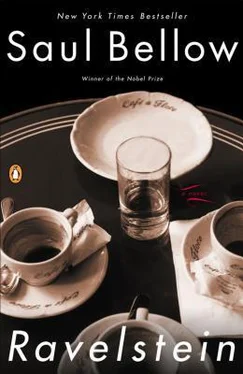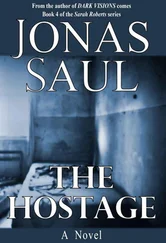The long and the short of it was that Ravelstein made a fast flight home to attend the mayors banquet for him and came down with a disease (first discovered by a Frenchman) that sent him to the hospital. The doctors put him in intensive care. They were giving him oxygen. His visitors were let in no more than two at a time. He said hardly anything. Occasionally he gave me a stare of recognition. His big eyes were concentrated in that bald, cranial watchtower of his. His arms, never well developed, quickly lost such muscle as they had had. In the early days of the Barrй virus he wasn't able to use his hands. Still he managed to convey that he needed to smoke.
"Not with an oxygen mask, you won't. You'd blow up the whole joint." Somehow I found myself stuck always in the cautionary role, speaking up for the commonest sort of common sense to people who took pride in brushing off prudence. Was it others who were forever putting me in this position, or was I at bottom exactly like that? I thought of myself, at hyper-self-critical moments, as the bourgeois _porte parole__. Ravelstein was aware of this flaw of mine.
Nikki and I were not unlike, in this respect. Nikki was far more sharp and critical. When Ravelstein bought a costly rug from Sukkumian on the North Side, Nikki shouted, "You paid ten grand for all these holes and loose threads-because the holes prove it's a genuine antique? What did he tell you, that this was the carpet they rolled Cleopatra in naked? You really are one of those guys, as Chick always says, who thinks money is supposed to be thrown from the rear end of an express train. You're on the observation platform of the Twentieth Century scattering hundred-dollar bills."
Nikki had been telephoned and told that Ravelstein was sick again. He was still at his hotel school in Geneva, and we learned that he was returning immediately. Nobody questioned the strength of Nikki's attachment to Abe. Nikki was perfectly direct-direct, by nature, a handsome, smooth-skinned, black-haired, Oriental, graceful, boyish man. He had an exotic conception of himself. I don't mean that he put on airs. He was never anything but natural. This protйgй of Ravelstein's, thought-or used to think-was somewhat spoiled. I was wrong, there, too. Brought up like a prince, yes. Even before the famous book that sold a million copies was written, Nikki was better dressed than the Prince of Wales. He was more intelligent and discerning than many bettereducated people. He had, what is more, the courage to assert his right to be exactly what he seemed to be.
This, as Ravelstein pointed out, was not a posture. There was absolutely nothing in Nikki's appearance that was decorative or theatrical. He doesn't look for trouble, mind you, but "he's always ready for a fight. And his sense of himself is such that… he'll fight. I've often had to hold him back."
He would sometimes lower his voice in speaking of Nikki, to say that there was no intimacy between them. "More father and son."
In matters of sex, I sometimes felt Ravelstein saw me as a throw back, an anachronism. I was his close friend. But I was the child of a traditional European Jewish family, with a vocabulary for inversion going back two millennia or more. The ancestral Jewish terms for it were, first, _Tum-tum__, dating perhaps from the Babylon captivity. Sometimes the word was _andreygenes__, obviously of Alexandrian, Hellenistic origin-the two sexes merged in one erotic and perverse darkness. Mixtures of archaism and modernity were especially appealing to Ravelstein, who could not be contained in modernity and overflowed all the ages. Oddly enough, he was just like that.
He came out of intensive care unable to walk. But he quickly re covered partial use of his hands. He had to have hands because he had to smoke. As soon as he was installed in his hospital room he sent Rosamund out to buy him a pack of Marlboros. She had been his student, and he had taught her all that a student of his was required to understand-the foundations and assumptions of his esoteric system. She understood, of course, that he had only just begun to breathe on his own again and that smoking was damaging, dangerous-it was almost certainly forbidden.
"You needn't tell me that it's a bad idea to smoke now. But it's even worse not to smoke," he said to Rosie, when he saw her hesitate.
Of course she understood, having taken every last course he offered. "So I went down to the vending machine and brought up six packs of Marlboros," she told me.
"If you hadn't done it, ten other messengers would have," I said.
"They sure enough would."
At the hospital his best students-the inner circle-came and went, gathered, chatted in the waiting room.
On the second day after release from intensive care, Ravelstein, who hadn't recovered the use of his legs, was once more on the telephone with friends in Paris, explaining why he would not be coming back just yet. The apartment had to be given up. His aristocratic landlords would have to be approached with tact to return the _dйpфt de garanti__. Ten thousand dollars. Maybe they'd cough it up, maybe not. He could understand their feelings, he said. Those were the most beautiful, the most distinguished rooms he had ever lived in, he said.
Ravelstein didn't count on recovering his deposit, though he was highly connected in French academic circles. He had lots of important connections in France-and in Italy as well. He knew perfectly well that there was no legal way to recover his earnest money. "Especially in this instance, because the tenant is a Jew, and there's a Gobineau in the landlord's family tree. Those Gobineaus were famous Jew-haters. And I'm no mere Jew but, even worse, an American one-all the more dangerous to civilization as they see it. Any way, they will let a Jew live on their street, but he _should__ pay for it."
In an off moment, weakened by the disease, eyes only half open and in a voice in which the words were unclear and the tones had to carry most of the meaning-several days when his speech was like his narrowed gaze-he kept trying to tell me something. What he was trying to say at last became clear-that he was even now arranging for a BMW to be sent over.
"From Germany?"
So it seemed, though he didn't actually say that it was being shipped. I had the impression that it was already on a freighter in mid-Atlantic. Maybe even unloaded and being trucked to the Midwest.
"It's for Nikki," Ravelstein said. "He feels he should have something outstanding and entirely his own. You can see that, can't you, Chick? In addition, he may have to drop out of his Swiss school."
This was not put to me as a question. I could see it well enough. For one thing, if you were dressed-as Nikki was-by Versace, Ultimo, and Gucci, you didn't want to use public transportation. But having satisfied my quirky need for humor with such an observation, I was now able to be real. The reality was that Ravelstein had barely squeaked by, that he was still on what doctors called "life supports," that his lower body was still paralyzed, his legs were not working, and that if and when paralysis was overcome there were still other infections waiting to be reckoned with.
"Now tell me, thee-ah Chick, how do I look to you?"
"The face?"
"Face, head. You have a peculiar eye, Chick. And don't hold back."
"You look like a ripe honeydew melon, on the pillow."
He laughed. His eyes narrowed and glinted; he took a peculiar satisfaction in my mental ways. He saw this kind of remark as a sign of higher faculties in operation. About the car he said, "The agency was trying to sell me on some wine-colored BMW. I prefer the chestnut one. Over there is a chart of the colors-" He pointed, and when I handed it to him he flipped it open. Bar after bar of enamel strips. Soberly studying the samples, I said that the wine color wouldn't do.
Читать дальше












